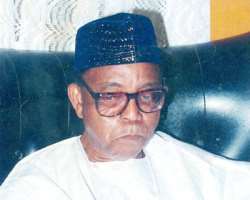ENAHORO, A MAN OF MANY STRUGGLES

Following his secondary education at Kings College he immediately enrolled in the journalism profession that being one of the sharpest tools in the battle against colonial rule. Enahoro at the age of 21 was to become the youngest editor ever of a Nigerian newspaper when he was in 1944 appointed the editor of the Ibadan based Southern Nigerian Defender owned by Dr. Nnamdi Azikiwe. He was to later edit Comet, a Kano based newspaper also owned by Azikiwe, himself at that time a leading apostle in the anti-colonial battle.
He was also associate editor of the West African Pilot, based in Lagos and Editor -in_Chief of the Morning Star up till 1953.
He became a foundation member of the Action Group and was the secretary and subsequently chairman of the party in the Ishan Division council. He was elected into the Western House of Assembly on the ticket of AG and served as Home Affairs Minister and in 1951 he was elected into the House of Representatives on the platform of the AG where he served as the spokesman of the opposition on Foreign Policy and Legislative Affairs.
Late Chief Enahoro
It is remarkable that when he redirected his energies towards the political terrain that he chose the AG led by Awolowo and did not follow the political footsteps of the legendary Zik under whom he cut his teeth in journalism.
In 1953 he achieved his greatest legacy in the anti-colonial struggle with a motion for self_governance by the nation's three regions by the year 1956. In moving the motion which was seen then as a revolutionary step towards independence, Enahoro said: 'The question for independence for Nigeria is not controversial. Every well-meaning Nigerian wants this country to become independent. Why then do I choose 1956? There are only three reasons that I can give right here.
'The first is that 1956 is a convenient date especially when the other two reasons are added. These are, the factors of previous commitments by the various regional governments and the federal government as well, and the fact that 1956 marks the end of MacPherson constitution. I therefore beg to move'.
His motion was, however, countered by the Sardauna of Sokoto, Sir Ahmadu Bello who successfully aborted the Enahoro motion by removing the time line built into it.
'Since my honourable colleagues do not wish to withdraw the motion, I hereby move an amendment substituting for 1956, the phrase 'as soon as practicable.'
Enahoro's move was, however, believed to have led to quickening the steps towards independence.
Following independence on October 1, 1960 Enahoro stuck with Awolowo on the opposition benches and eventually became a central figure in the political crisis that broke out in the Western Region. He found his way to Britain in 1962 but was extradited to face trial in Nigeria in 1963 and was eventually found guilty of treason.
He was in prison when the military struck for the first time in the life of the new nation and was released alongside other political associates including Awolowo.
He was active in brokering peace during the Nigerian Civil War and was in 1967 appointed Federal Commissioner for Information and Labour by the General Yakubu Gowon regime and served in that portfolio until 1975 when he was appointed Federal Commissioner for Special Duties.
Preparatory to civil rule in 1979, Enahoro to the surprise of some delinked from Awolowo and found cohabitation with the National Party of Nigeria. He became the first Chairman of the NPN in 1978 and was replaced in 1982 by Chief Tony Anenih, who was then making his first mark on the political terrain.
Following his ouster, Enahoro remained largely outside the public arena until the mid nineties when he again re_emerged to lead the struggle for democracy as head of the National Democratic Coalition, NADECO. He headed abroad as the struggle became a life and death issue on the part of the Sanni Abacha regime and returned to the country on the death of Abacha.
Enahoro was, however, not satisfied with the kind of democracy that was birthed and continued his struggle for better governance first using the civil rights group, Movement for National Reformation, MNR which subsequently transformed into a political party. however, by mid decade, he upped his struggle for better governance under another umbrella, the Pro-National Conference Organization, PRONACO.
He was engaged in that struggle till he died on Wednesday.
Born on 22nd July 1923, Enahoro was awarded an honourary Doctor of Science degree by the University of Benin in 1972, he was awarded the Commander of the Federal Republic, CFR, in 1982 by President Shehu Shagari.
He was survived by his wife, Helen and five children, Kenneth, Eugene, Bella, Victor and Gabriel.
